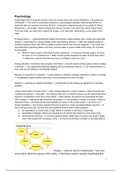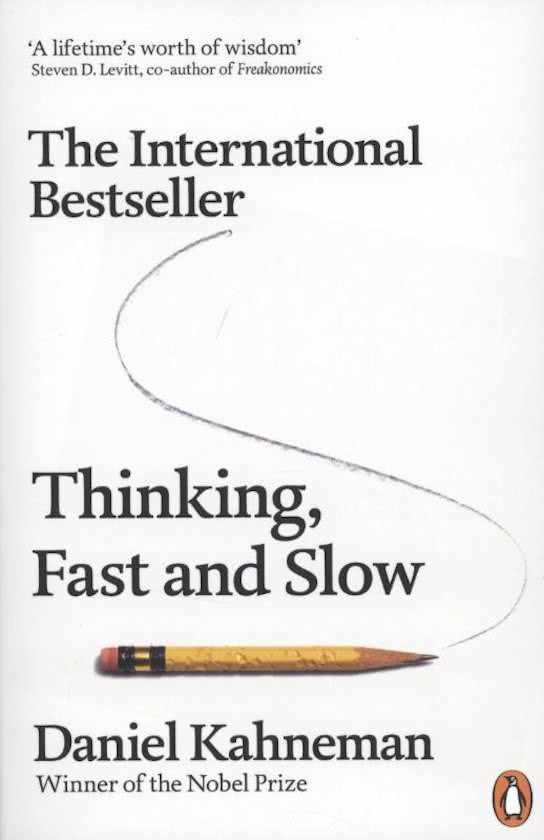Psychology
Psychology aims to study the human mind, the human brain and human behaviour -> focussing on
individuals -> if we want to understand behaviour, psychologists typically make people perform a
particular task and examine how they do that -> behaviours depend closely on our goals for those
behaviours -> the longer I keep browsing the internet, the less I can teach you about today’s topic.
This may make you want me to search for longer, or for less time, depending on your goals in this
class
Foraging theory -> understanding the trades that humans make between time, energy and expected
reward -> searching for a cheap holiday online (diminishing returns) -> might see stopping early as
irrational because there may still be a better solution that we don’t find by stopping. -> we could also
say that further searching takes more time, and we prefer to spend a little extra money for a lot less
time invested
● What if it takes longer to find the first price reduction? -> during our first few pages, we have
no return on our invested time -> likely to stop quicker because we seem to have less return
-> makes the customer feel like the price is not likely to drop any more
Acting rationally ->individual has complete information -> we will explore all the options before making
a decision -> this apparently irrational stopping can be considered rational -> if we note that time is a
cost, and we are making a cost-benefit analysis
Behaviour is specific to a situation -> as the setting or situation changes, behaviour is likely to change.
-> we generally spend months choosing a house because the cost is so high
Reward -> anything we interpret positively -> implies that we will change our behaviour to increase
rewards
press a lever when you see a light -> if the monkey does this, it gets a reward, a drop of sweet juice
‘conditioned stimulus’ -> the light -> the stimulus that has no inherent reward, but the animal has been
trained or conditioned to link this to the reward -> after training, the animal has associated the light
with a reward -> seeing the light becomes rewarding -> it now predicts a reward is coming -> leads to
dopamine firing -> the stimulus became rewarding in place of the actual reward -> the juice is no
longer rewarding -> the monkey expects the juice to arrive so it has no reward activity anymore -> if
we do not give any juice, we see very low dopamine activity when it was expected
● an expectation of reward has a major effect on whether a stimulus is rewarding
● associations between stimuli and rewards do not require the reward to come every time
● reinforcement learning -> if we had a reward before, better take an action now to get it again,
even if the reward did not always come -> a chance of winning is enough to motivate actions
Reality -> what we want to characterise -> we have
some theory about the nature of this reality -> this theory leads to specific hypotheses that
1
,make specific predictions about what will happen in certain situations -> test these situations
and observe what happens -> we evaluate if the outcomes are consistent with our
hypothesis -> adjust our theory accordingly -> new view of reality
● In an economic exchange -> based on a physical reward with monetary value -> the
amount of effort we give will depend on the reward given -> money amount (or when
you e.g. say 5.00 of candy -> associated with money)
● Social exchange -> the social goodwill reward cannot be quantified -> the amount of
effort given does not depend on the extent of a social reward -> social rewards give a
high effort level whether the reward is low, high or even absent -> chocolate bar
How to get best effort: asks as a favour (following the work with a good social experience will
demonstrate that the effort is appreciated -> drink a beer together) or pay properly
One example of a situation where it’s important to see unexpected changes -> driving or
cycling:
● it should be harder to notice unexpected changes when the scene is less visible, like
in fog -> should take care driving or riding in fog
● changes should be harder to notice when they look like irrelevant parts of the scene
-> wise not to dress in the faded red of a cycle lane -> people are less likely to notice
a change when doing another attention demanding task -> do not see the change of
colour
The interpretation here is that people don’t apply logical rules correctly ->they over-extend
what the rule means -> imposing an excessive bias towards matching pairs: i.e. participants
think a consonant letter must also go with an odd number.
2
,System 1
● Glancing at an image and sensing the emotion -> Automatically and quickly
● Generates impressions and feelings -> main source of explicit belief and deliberate choices of
system 2
● Born with certain skills of system 1 such as fearing spiders -> other activities become
automatic due to practice -> as you become skilled, demand for energy diminishes -> talent
has same effect
○ Learned association between ideas -> capital of France
○ Learned skills such as reading
○ -> knowledge stored in memory -> accessed without intention and effort -> can’t
refrain from access -> system 1 can’t be turned off -> understanding simple
sentences in your own language
● Has biases -> little understanding of logical and statistics -> biases can’t always be avoided ->
system 2 may have no clue to the error
○ Constantly questions our own thinking is impossible -> system 2 much too slow and
inefficient -> best we can do is to learn to recognize situations in which mistakes are
more likely
● Observes that ‘a tidy soul needing order’ caricatures a librarian, but system 2 is the one which
combines this intuition with knowledge about the small number of librarians -> system 1 only
detects simple relations
● Judgement heuristic: system 1 has been shaped by evolution -> to provide continuous
assessment of problems which must be solved to survive -> ability to discriminate friend from
foe at glance -> intuition -> can’t explain nor defend -> two crucial factors in assessing friend
from foe:
○ Dominance (potentially threatening) -> judged by shape of his face -> square chin ->
dominance
○ Trustworthiness -> judged by facial expressions -> assesses stranger’s intentions ->
frown/smile
A first glance provides many features of a display -> however with blocks, you do not know
how many blocks there are -> you need to count them -> system 2 -> system 1 deals well with
averages but poorly with sums
● Tends to neglect quantity -> ‘different groups stated their willingness to pay to save 200, 2000
and 20000’, paid 80, 78 and 88
System 2
● 24 x 27 -> Allocates attention to the effortful mental activities that demands it -> disrupted
when attention is drawn away
● System 2 protects the most important activity so it receives the attention it needs, spare
capacity is allocated to other tasks
● System 1 can generate complex patterns of ideas due to automatic operations, but only
system 2 can construct thoughts in an orderly series of steps
● Orienting to a loud sound is an involuntary operation of system 1 -> which immediately
mobilizes voluntary attention of system 2
● Some ability to change the way system 1 works -> programming the automatic functions of
attention and memory
○ Waiting for a relative at a train station, can set yourself looking for a white-hair woman
which increases the likelihood of detecting the relative
○ Program your memory so that the relevant words are on the tip of your tongue (upper
lower)
● When all goes smoothly, system 2 adopts the suggestions of system 1 with little or no
modification -> system 1 running into difficulty? -> calls on system 2 to support more detailed
3
, and specific processing -> many people are overconfident in their intuitions -> overriding it
required hard work -> most people do not take the trouble to think through the problem -> lazy
thinking -> failure of rationality
● System 2 is activated when an event violates the model of the world that system 1 maintains
-> gorillas normally do not cross basketball courts -> some attention is needed for the
surprising stimulus to be detected
● In charge of self-control (self-control needs attention) -> overcoming the impulses of system 1
-> disrupted when drunk, cognitively busy, sleep deprived or concern about how well one is
doing in a task (loading short-term memory with anxious thoughts)
○
○ Top one looks longer than the bottom line, are in fact
identical. You choose to believe the measurement but can’t prevent system 1 from
doing it’s thing. Must learn to mistrust your impressions
Everyone has limited capacity of attention
● intense focussing can make people blind -> basketball example with gorilla suit appearing ->
counting task and ignoring one of the team causes the attentional blindness
● While walking, ask him to compute 23 x 78 in his head, he will almost certainly stop walking
○ Increasing pace of walk -> sharp deterioration in ability to think -> attention drawn to
experience of walking and maintaining the faster pace
■ In addition to physical effort, a mental effort of self control is needed to resist
the urge to slow down -> self control and thought apparently draw on the
same limited budget of effort
Cognitive illusions = illusions of thought
Pupils
● indicators of mental effort -> dilate more if the problem are hard -> if people are asked to work
harder than they are capable, they give up -> pupils stop dilating or shrink -> pupils also stop
dilating, besides giving up, when someone finds a solution
● Remained small when she talked and listened -> demanded little or no effort
Add-3 = When the digits on the cards are 5294, correct answer is 8527
Law of least effort = if there are several ways of achieving the same goal, people will eventually
gravitate to the least demanding course of action -> time pressure increases effort
Flow = concentration so deep that they lose their sense of time, themselves and their problems ->
maintaining focused attention on the absorbing activities requires no self-control, thereby freeing
resources to be directed to the task at hand
People who are involved in demanding cognitive tasks:
● are more likely to yield to a temptation -> you would rather select the tempting cake than a
salat when your mind is loaded with digits
● cause of weakened self-control: more likely to make selfish choices, use sexist language and
make superficial judgements
4






